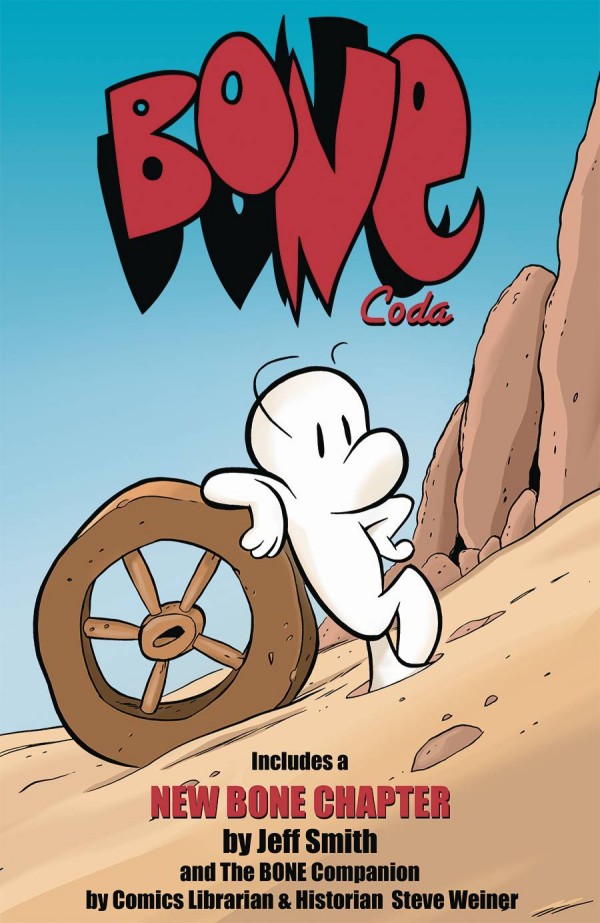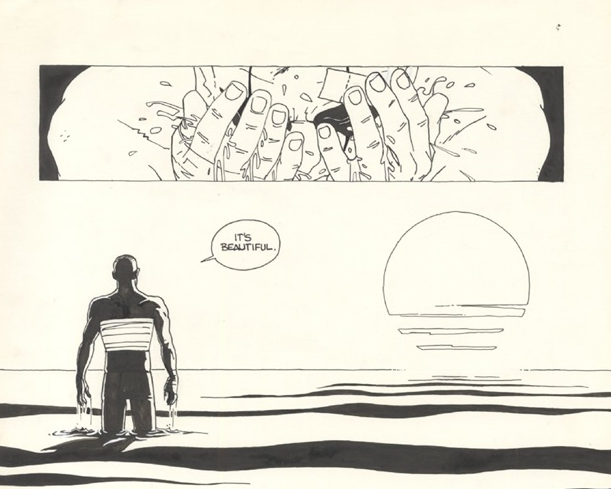 Written by Sarah Glidden
Written by Sarah GliddenIllustrated by Sarah Glidden
Vertigo
As I write this, it becomes even clearer to me that Vertigo as we know it is probably going away. That would be a shame, because in addition to doing some nifty work with old DC properties and creator-owned work, Vertigo also does books like this one now and again. Any time books like this have one less place to exist is a sad day, and I really hope I'm wrong and not writing yet another publisher obituary in the near future.
Perhaps I'm just feeling somber because of the subject material of Glidden's book. Glidden is someone who could easily be a friend of mine, if we'd traveled in the same circles. She's a politically liberal person with Jewish heritage who now struggles with the concept of the State of Israel and the never-ending political problems there.
In this part travelogue, part political discussion, part introspective, Glidden thinks hard about the issues surrounding the Israeli-Palestinian conflict while attempting (as best she can) to experience them firsthand by going on a birthright trip. It's an admittedly odd choice for a person who is avowedly against the current political leadership of Israel, but she finds the chance to see things for herself irresistible and who could blame her for taking advantage of an almost entirely free trip?
Almost immediately, we can see how hard this is going to be on Glidden. She's dating a person with Arabic heritage, who fears she'll come back brainwashed. (That turns out not to be true, but though we don't get closure on their relationship, there are strong hints that this trip did strain things.) Glidden has surrounded herself, as we often do, with people and books who think as we do, and at every step of the way, she's surrounded by those who think otherwise. They are her fellow passengers on the trip, who seemingly buy into everything told to them by the various guides on the tour. They are also the guides, who frequently show only Israel's side in the various pressure points visited on the trip. They certainly include the many people she interacts with on the trip, who try to explain to Glidden that things are not as simple as a "peace activist" in the United States might try to make them.
Glidden carries around the weight of her opinions for most of the book until it becomes almost too much for her. Confronted by a country that is far more complicated than she expected, the analogy of her peace prayer getting ripped in half is a telling sign of her own feelings on the matter. In an ideal world, Glidden (and those who think like her) would get their way, the two sides would live in peace together, and everything would be okay.
Unfortunately, as this book goes on to show, it's just not that simple and probably never will be. To her credit, Glidden allows the other side to have their say, and often from characters that we've come to think of as reasonable people, not angry straw men. It would have been extremely easy for Glidden to create unlikable characters and given them all the Zionist arguments, allowing her side of the debate to shine. She does nothing of the kind, and that's what makes this such a great book.
Instead, what we get is basically an ongoing conversation, as Glidden matches up her understandings against what she sees in Israel. It leads to some pointed conversations and frank exposures of some of the worst propaganda that Israel feeds the birthright tourists, especially when it comes to decisions that are particularly egregious, like the treatment of the Bedouins. On the other hand, when Glidden tries to combat such obvious problems, she's careful to allow the plight of the common Israeli to show, too. We hear about bad things done to Palestinian settlers, but also the terror of losing loved ones to extremists on the other side. Walls and checkpoints are awful, but when bombings go from being almost daily to only quarterly, can you blame the people of Israel from supporting them?
If you're looking for an answer from either me or Glidden, you're in the wrong place. Like the author, I don't know what the answer is. If I did, I'd hope that I'd get involved in making a change. As it stands, I don't even know if it's fair for me to give an opinion at all. I'm not Jewish, and while I have ancestors who were oppressed, none of them were about to die just because of their religion or have a centuries-long history of being oppressed or killed just because of what the opted to do one day out of the week. Similarly, I live in a country that is freely elected, even if I don't always agree with how that turns out. I can go where I like (I just returned from a trip where I traveled several hundred miles and crossed quite a few borders of various kinds, all without even showing a single form of identification.), I can make my own decisions, and the only thing blocking me from my job might be road construction.
Glidden and those she features in this book are closer to the problem, but in the end, it seems like no one can find a way out of the trap that is the Israeli-Palestinian conflict. They want peace, but the road is filled with leaps of faith. Ironically, in a strip of land where you can't throw a stone without hitting something religiously significant, the faith to take a step fraught with danger is sorely lacking.
(Easy for me to say, right? It won't kill me to take that chance, but it certainly might kill them.)
There are so many moments in this book that lead to thinking critically, and that's one of the things I love about it. When Glidden is faced with a position she hasn't considered, it makes the reader think about it, too. Rather than give the reader easy answers, however, Glidden keeps her personal avatar off-balance, questioning everything and finding certainty only in uncertainty. This lack of decision would certainly offend those who are virulently pro or anti Israel, but as someone who recognizes that complicated issues require a complicated response, I appreciate that Glidden never makes it simple for herself or her readers as the book progresses.
I do, however, have some issues with the lack of closure. Maybe Glidden isn't sure of herself anymore, but I'd have liked more of a coda explaining what happens next. Is she still with her boyfriend, or did this trip create the rift I think it might have? Will she continue to read only texts which side with the Palestinians in this conflict? As a reader who has formed a connection with Glidden as she examines her conscience, I want to know what has really changed for her. That is, after all, the point of the birthright trip. The fact that we're denied this closure is my biggest problem with the book, though not enough to significantly impact on my opinion of its quality.
I realize I've talked very little about Glidden's artwork, which is odd given this *is* a comic after all. Like Bechtel's Fun Home, How To Understand Israel in 60 Days or Less is very much a graphic novel in the truest definition. This is a novel with illustrations more so than a work in which the art is an essential part of the story. I could have easily read either book in prose form and gotten a lot of the same information and personal reaction.
That's not to discount the visuals in either text, but I do think it's fair to note that those who want to read a book for the visual impact of the story will be rather disappointed. Glidden does a great job of picturing Israel for the reader, based on my limited knowledge of the geography and historical locations. She also does a few neat tricks with ghosts and avatars during the course of the book, but overall, if had only read the text and never looked at the pictures, I don't think I would have missed much.
I appreciate Glidden's fidelity to detail, and I really like how the watercolored style of the visuals gives this book a less polished feel and a more muted look. Her illustrations never cause a problem for the narrative and do work well with her theme, especially when she plays with the truth and starts making up things in her head. There's just not a lot of that going on, and I think it's a fair criticism that as a comic, this book might be lacking in some areas.
As a story, however, it's extremely powerful. I was unable to read more than a chapter at a time and by the time we got to the Holocaust Museum, I started to feel ill. We have so much to answer for as a society, and should it come to a judgment day, I worry that too many of us have looked the other way in this world to bear the scrutiny.
How to Understand Israel in 60 Days or Less is a complicated book taking on a complicated subject. Glidden not only makes the reader think about the situation in Israel, but also how we form our opinions and who we get our information from. What do we take for granted that has so much bias built in? What should we do to get a more balanced picture on controversial issues, from abortion to gay marriage to social security to protecting against terrorism? We live in an age of unparalleled information, but as a friend pointed out to me recently, we no longer have to all play together in the same sandbox. We can simply move to the corner of the information superhighway that agrees with us.
That's quite easy to do. What's not so easy to do is to confront your own preconceived notions, as Glidden does in this book. For that reason alone, How to Understand Israel in 60 Days or Less provides a valuable lesson for all those open-minded enough to see it. I don't think this book offers much hope for peace in Israel, but maybe, just maybe, anyone who reads it will start to think about why they think the way they do. If we could all do that, this world would be a better place.
If Glidden manages to make just a few of her readers think twice about all that they believe without question, she's having quite a bit of impact on the world. That could only be a good thing. If you're willing to challenge your notions, too, watch and learn from Glidden. That's the power of a great book, whether it has words, pictures, or a bit of both. In my opinion, How To Understand Israel in 60 Days or Less is just such a book.







